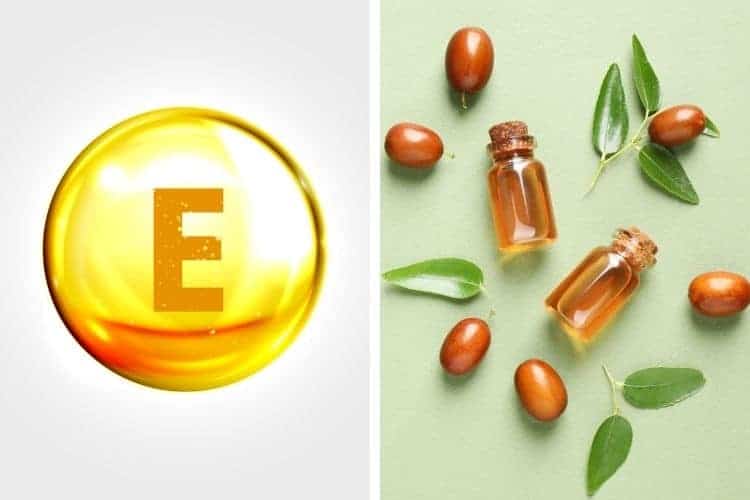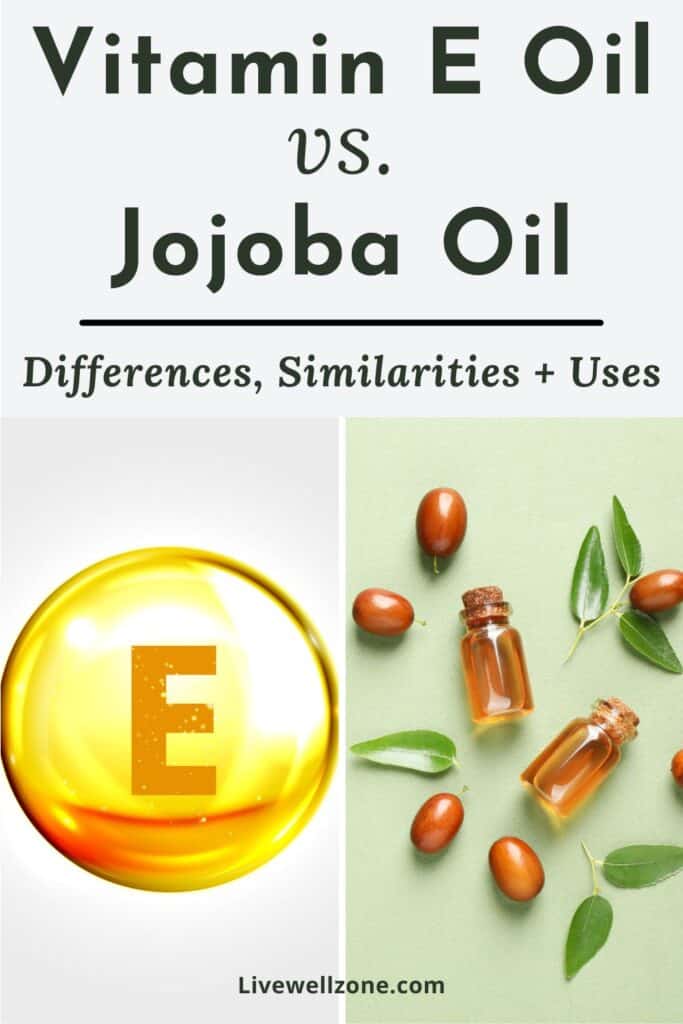
Like many skin care oils, vitamin E oil and jojoba oil have properties that can enhance the health of your skin (if used properly). So, in this guide we’re going to look at both oils, focusing on:
- their benefits for the skin.
- how to use them in your skin care routine.
- tips to keep in mind when choosing a vitamin E oil, plus some products that contain vitamin E and jojoba oil.
Note: this post contains affiliate links and I earn a commission (at no additional cost to you) if you use them to make a purchase.
| VITAMIN E OIL | JOJOBA OIL | |
|---|---|---|
| Contains natural vitamin E | ✓ | ✓ |
| May contain synthetic vitamin E | ✓ | |
| Regulates sebum | ✓ | |
| Antioxidant | ✓ | ✓ |
| Anti-inflammatory | ✓ | ✓ |
| Photoprotective | ✓ | |
| Non-comedogenic | ✓ | |
| Skin types | mainly dry skin | all |
IS JOJOBA OIL THE SAME AS VITAMIN E?
Jojoba oil is made from the seed of the simmondsia chinensis plant, while vitamin E oil is made from synthetic or naturally extracted vitamin E. Overall, jojoba oil has some of the highest amounts of vitamin E (in the form of tocopherols). Of these tocopherols, gamma tocopherol accounts for about 79% of jojoba’s vitamin E content.
Also, since the jojoba seed is rich in vitamin E, it can be used as a source of the vitamin E that ends up in vitamin E products.
BENEFITS OF JOJOBA OIL FOR FACE

- Balances sebum production: jojoba oil is structurally similar to the skin’s sebum. This similarity comes mainly from the fact that jojoba is made up of wax esters and the skin’s sebum comprises about 25% wax esters. As a result, it’s believed that topical application of jojoba may help regulate sebum production.
- Natural source of vitamins: some of the notable vitamins in jojoba oil are vitamins A, D and E. Together these vitamins help to support cell renewal, combat inflammation and protect the skin from free radical damage.
- Non-greasy and non-comedogenic: not only is jojoba oil pretty lightweight, but it absorbs quickly. This rapid absorption means it doesn’t sit on the skin for long, nor is it likely to clog pores or leave a greasy residue.
- Anti-inflammatory: jojoba is soothing to inflamed skin and it’s frequently used as a natural remedy for acne. In addition, jojoba oil has shown promising results in the treatment of conditions like psoriasis.
- Natural emollient: jojoba is an excellent emollient that keeps the skin soft and supple. This is mainly due to its vitamin E content as well as the presence of sterols. These sterols are cholesterol-like compounds that are usually found on the skin’s surface. They help to keep the skin lubricated.
- Contains antioxidants: besides vitamin E, jojoba oil contains other antioxidants, including flavonoids and phenols.
- Suitable for all skin types: because it has some similarities to sebum, jojoba oil usually works well for all skin types. This includes very sensitive skin, as well as acne-prone and oily skin. In fact, it seems to be particularly helpful for acne because it is a liquid wax and as such, can better penetrate the hair follicles. Once in the follicles it can remove comedones, thus improving pimples.
BENEFITS OF VITAMIN E OIL FOR SKIN

- Antioxidant and photoprotective: vitamin E plays an important role in protecting the skin from oxidative damage, including damage resulting from sun exposure. In addition, vitamin E may also be helpful in reversing existing skin damage.
- Emollient: as an emollient, vitamin E works to keep the skin soft, supple, pliable and hydrated. Not only does this result in healthier looking skin, but it can also help to soften the appearance of fine lines and wrinkles.
- Boosts and stabilizes vitamin C: when used in skin care products that vitamin C, vitamin E helps to stabilize it and boost its action. This is why most vitamin C serums are formulated with vitamin E.
- Anti-inflammatory: topical application of vitamin E has been shown to redness, swelling and water retention caused by UV exposure (source).
- May reduce hyperpigmentation: due to its antioxidant properties, vitamin E is often used as a natural remedy for dark spots.
- May help with scars: although scientific research doesn’t support the use of vitamin E for scars, some people use it for this purpose. So, it may be worth a short if you’re trying to fade scars.
- Easily absorbed: most of the vitamin E that we apply topically ends up mainly in the epidermis and some of it goes through to the dermis. In addition, it doesn’t take a lot to increase the skin’s vitamin E levels. Products that contain as little as 0.1% vitamin E have been shown to be effective (source).
- Not ideal for all skin types (in oil form): pure vitamin E oil is thick and as such, it is better suited for dry skin. In addition, pure vitamin E oil may also clog pores. However, if you’re using a product formulated with vitamin E – such as a serum or cream – these issues are usually less of a concern. This is because the amount of vitamin E used is usually very small.
HOW TO USE VITAMIN E AND JOJOBA OIL FOR SKIN (PLUS TIPS FOR MIXING)
Since vitamin E oil is quite thick and likely to cause irritation for some people, it’s best to dilute it with a carrier oil like jojoba oil. A 1:10 dilution ratio is suitable. This equates to 1 drop of vitamin oil and 10 drops of jojoba. If you’re trying to improve scars, you can experiment with using a higher amount of vitamin E.
Now, here are some additional tips for incorporating vitamin E and jojoba oil in your beauty routine:
- Always apply the oils to damp skin. This gives the oils some actual moisture to lock in or seal.
- Keep in mind that a lot of vitamin E oils contain synthetic forms of vitamin E. If possible, use a vitamin E oil that is naturally derived. You can get twice as much potency from the natural forms than from the synthetic forms. However, if you can’t get the natural form, then look for synthetic alpha-tocopherol. Of the many synthetic forms that are out there, it’s the only one that is closest to the natural form.
- You can use jojoba oil as a carrier oil for essential oils. This guide walks you everything you need to know about using essential oils on your skin.
- Jojoba oil also works well in facial oils blends. Check out these DIY facial oil recipes to get started.
BEST JOJOBA AND VITAMIN E OILS FOR FACE
1. Levan Rose Vitamin E Oil
This vitamin E oil contains d-alpha-tocopherol from sunflower seeds. Overall, it provides 75,000 IUs of vitamin E per ounce. Unlike other vitamin E oils that are sometimes mixed with other oils, this is 100% vitamin E and ideal for any DIY project you might have in mind.
2. Health Priority Vitamin E
Infused with jojoba, avocado and rice bran oil, this nourishing vitamin E oil can be used as is or in a DIY blend.
GET HEALTH PRIORITY’S VITAMIN E OIL
3. Cliganic Jojoba Oil
An Amazon favorite and a personal favorite, this jojoba oil is organic and cold pressed. It has a very mild, nutty scent and pale golden color. Works great on its own or in a blend.
VITAMIN E OIL VS JOJOBA OIL FOR STRETCHING EARS

Since jojoba oil closely resembles sebum, it is often recommended for ear stretching. Not only does it keep the ear lobes lubricated, but it can soothe any potential inflammation that arises. While vitamin E oil offers some of the same benefits, it’s also more likely to cause irritation (especially to delicate skin that is being stretched).
To use jojoba oil for ear stretching, you can massage 2 drops into the skin around the ear lobes, as well as your plugs (source).
FAQs ABOUT USING VITAMIN E OR JOJOBA FOR SKIN
What oil is closest to jojoba oil?
Meadowfoam oil is somewhat similar to jojoba oil because it contains three fatty acids that are in jojoba: eicosenoic acid, erucic acid and docosadienoic acid. However, meadowfoam oil does not contain oleic acid (which jojoba does).
Overall, if you’re looking for an oil that might produce similar sebum-balancing results as jojoba oil, meadowfoam looks like the closest alternative.
Should I use vitamin E oil before or after moisturizer?
For the best results, vitamin E oil should be used after a water-based moisturizer. This allows the oil to do what it’s supposed to do: seal moisture.
CONCLUSION
Overall, jojoba oil is a true carrier oil for the skin because it doesn’t need to be diluted and can be used as is.
On the other hand, vitamin E oil generally needs dilution since it can irritate some skin types.
Hopefully this article has given you a better understanding about how these oils are different yet complementary!

Grapeseed Oil vs Jojoba Oil for Skin: Which Is Better & How to Use
Comparing Vitamin C Serum vs Vitamin E Serum: Benefits, How to Use and Which Is Better
Rosehip Oil vs Jojoba Oil for Face (And Body): Which is Better and How To Use
What To Mix With Jojoba Oil For Face – The Ultimate Guide
Non-Greasy Carrier Oils For Skin: 10 Oils To Fall In Love With




